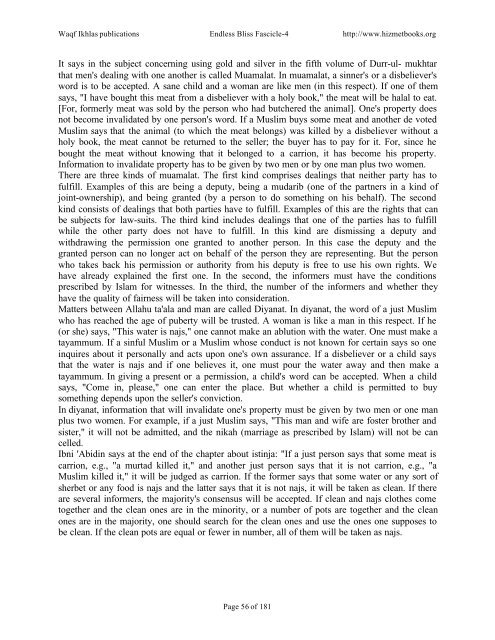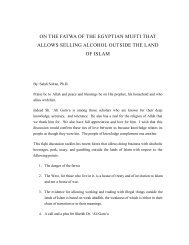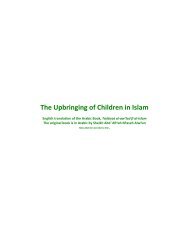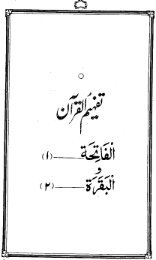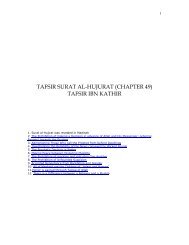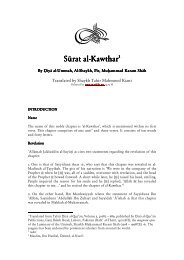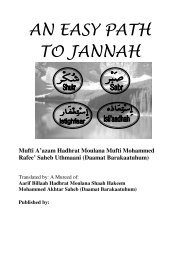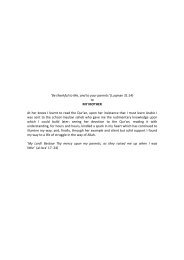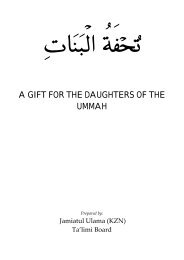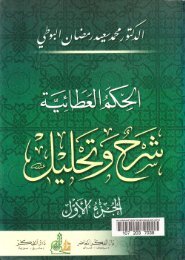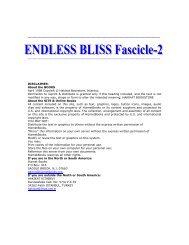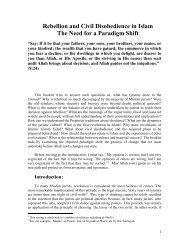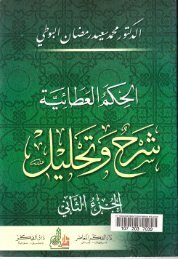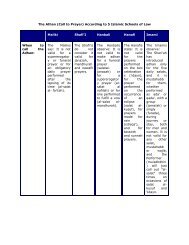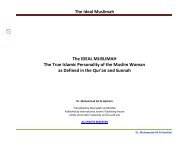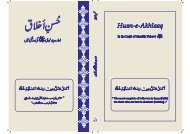ENDLESS BLISS FASCICLE-4
ENDLESS BLISS FASCICLE-4
ENDLESS BLISS FASCICLE-4
You also want an ePaper? Increase the reach of your titles
YUMPU automatically turns print PDFs into web optimized ePapers that Google loves.
Waqf Ikhlas publications Endless Bliss Fascicle-4 http://www.hizmetbooks.org<br />
It says in the subject concerning using gold and silver in the fifth volume of Durr-ul- mukhtar<br />
that men's dealing with one another is called Muamalat. In muamalat, a sinner's or a disbeliever's<br />
word is to be accepted. A sane child and a woman are like men (in this respect). If one of them<br />
says, "I have bought this meat from a disbeliever with a holy book," the meat will be halal to eat.<br />
[For, formerly meat was sold by the person who had butchered the animal]. One's property does<br />
not become invalidated by one person's word. If a Muslim buys some meat and another de voted<br />
Muslim says that the animal (to which the meat belongs) was killed by a disbeliever without a<br />
holy book, the meat cannot be returned to the seller; the buyer has to pay for it. For, since he<br />
bought the meat without knowing that it belonged to a carrion, it has become his property.<br />
Information to invalidate property has to be given by two men or by one man plus two women.<br />
There are three kinds of muamalat. The first kind comprises dealings that neither party has to<br />
fulfill. Examples of this are being a deputy, being a mudarib (one of the partners in a kind of<br />
joint-ownership), and being granted (by a person to do something on his behalf). The second<br />
kind consists of dealings that both parties have to fulfill. Examples of this are the rights that can<br />
be subjects for law-suits. The third kind includes dealings that one of the parties has to fulfill<br />
while the other party does not have to fulfill. In this kind are dismissing a deputy and<br />
withdrawing the permission one granted to another person. In this case the deputy and the<br />
granted person can no longer act on behalf of the person they are representing. But the person<br />
who takes back his permission or authority from his deputy is free to use his own rights. We<br />
have already explained the first one. In the second, the informers must have the conditions<br />
prescribed by Islam for witnesses. In the third, the number of the informers and whether they<br />
have the quality of fairness will be taken into consideration.<br />
Matters between Allahu ta'ala and man are called Diyanat. In diyanat, the word of a just Muslim<br />
who has reached the age of puberty will be trusted. A woman is like a man in this respect. If he<br />
(or she) says, "This water is najs," one cannot make an ablution with the water. One must make a<br />
tayammum. If a sinful Muslim or a Muslim whose conduct is not known for certain says so one<br />
inquires about it personally and acts upon one's own assurance. If a disbeliever or a child says<br />
that the water is najs and if one believes it, one must pour the water away and then make a<br />
tayammum. In giving a present or a permission, a child's word can be accepted. When a child<br />
says, "Come in, please," one can enter the place. But whether a child is permitted to buy<br />
something depends upon the seller's conviction.<br />
In diyanat, information that will invalidate one's property must be given by two men or one man<br />
plus two women. For example, if a just Muslim says, "This man and wife are foster brother and<br />
sister," it will not be admitted, and the nikah (marriage as prescribed by Islam) will not be can<br />
celled.<br />
Ibni 'Abidin says at the end of the chapter about istinja: "If a just person says that some meat is<br />
carrion, e.g., "a murtad killed it," and another just person says that it is not carrion, e.g., "a<br />
Muslim killed it," it will be judged as carrion. If the former says that some water or any sort of<br />
sherbet or any food is najs and the latter says that it is not najs, it will be taken as clean. If there<br />
are several informers, the majority's consensus will be accepted. If clean and najs clothes come<br />
together and the clean ones are in the minority, or a number of pots are together and the clean<br />
ones are in the majority, one should search for the clean ones and use the ones one supposes to<br />
be clean. If the clean pots are equal or fewer in number, all of them will be taken as najs.<br />
Page 56 of 181


